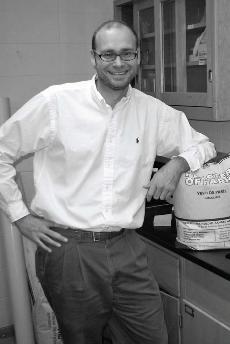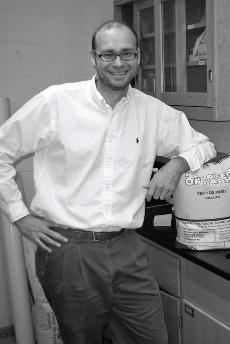
Photo by Nathan Lane (nathan lane)
Rachel Young: Have you always been interested in environmental studies?
Jeff Clark: Well, I’ve always liked rivers and playing in little creeks when I was growing up. The first course I took in high school was Earth science, and the instructor was very challenging. He was actually kind of like a grizzled old Korean War vet and he was really hardcore. In fact, he gave me an F on my first project. From then on, I just worked as hard as I could in that class and ended up doing well. I just really fell in love with the earth sciences. I just always have kind of been fascinated by the way things work; all sorts of things. How do computers work? How do you build a bridge? How does the earth work? I find all that kind of fun and interesting. Within geology then I found that earth surface processes, you know, things that are happening here and now and today on the earth’s surface, are much more engaging. I didn’t have the patience to read back into the rock record and try to infer what was going on. I kind of had to see it for myself, because I think I’m a very visual learner in that sense.
Young: If you could choose an environmental project that you would like to see the students and the university as a whole work on, improving the campus or the larger Appleton community, what would you like to see us undertake?
Clark: Well I think there’s plenty that we can do here [on campus]. Once we’ve got things going really well here, then I’d be more inclined to spend our efforts in a broader context – and I do believe that anything we do here helps that broader context as well. I’m very big on energy conservation, and I think that coming together to change our behaviors just a little bit to use less energy is like recycling now. When I was growing up in the ’70s, every light switch had a “turn me off” sign on it. You would always turn off the lights when you left a room. We don’t see that on very many light switches anymore. We’ve gotten comfortable and forgotten that basic conservation measures can make a difference. I would like to see everyone just pay more attention to what they’re doing. There are a couple of things that we have in the works currently – the whole campus will be invited to participate in Recyclemania, which will be taking place in winter term. It’s a national recycling competition where you record how much recycling is diverted from the garbage waste stream into recycling. You’ve probably walked by our recycling bins and seen some garbage in them, and then [conversely] seen some cans and bottles in the garbage, and so this would be an effort to really just make sure that everything that can be recycled is recycled. It’s my understanding that there are some compost bins in some of the smaller and larger houses, so anything that we can divert from garbage to recycle or turn into compost. You basically weigh stuff every week and then record and turn in how much progress you’re making. The nice thing there is that the people who take away our garbage are also the people who take away our recycling. They can just weigh the trucks before and then after they come back, so that’s kind of done for us! Some schools weigh everything individually and have internal competitions, like Hiett would be vs. Sage. We may do that in the future, but for our first year we’ll kind of want to keep it simple. Right now we divert about 30 percent of our waste to recycling, and I think we can do better, so, we’ll see.
Young: Lawrence recently received a C grade for environmental sustainability. Were you surprised? What was your reaction?
Clark: Well, one thing that I learned from Green Roots is all of the good things we are doing, just day-to-day things. Part of what’s going on with the score and ranking system is that we have to understand how to report what we’re doing better, because some things that we think are trivial – we’re saying “oh that’s just what we’ve always done. Is that green now? Oh okay.” I was a little disappointed but not too disappointed. First of all, we got a “D” last year, so we’ve stepped up. The administration got an “F” in their category last year and this year they have a “C.” The students had a “D” last year in their category and they have a “B” this year. The only one that I found troubling was buildings, where we got a “D” this year, and I will be speaking to the director of the sustainable endowments institute about that score and asking him how we can improve that. The grade can be a motivating grade as well. I certainly don’t think we’re in the A-range. I would have said that we would have been in the B-range or something like that. As an institution and making this [sustainability] a priority, we probably are a few years behind. A few schools started doing that about five years ago, and we’ve been doing it maybe for two years, so we are really running to catch up. Macalester, who received an A-minus, has an endowment that’s six times ours, and they have a full-time person who is a sustainability coordinator. They have the resources to do certain things that we cannot. On the other hand, we scored an A in food. Why? Because we have a garden that takes all of our compost, and we sell it back to the dining hall. That’s something Macalester can’t do; they are really in a city and they don’t have space like we do. So, each school has its own advantages and things like that. I would anticipate that in a few years we will be the high B-plus, low A-minus range, but we have to figure out how to continue this [path to sustainability] as well.
Young: So do you think that we are an example for the community of Appleton as far as what we do here with sustainability? Do you think that sustainability is important to people in this community?
Clark: I think it’s important to some people in this community. Appleton is a fairly good-sized community and it’s interesting to think in even broader terms of the Fox Cities. Neenah is very forward and very green. They’re coming up with their own kind of sustainability plan for the town, whereas Grand Chute is telling people they can’t have solar panels. There are very patchy elements here. We are an integral part of Appleton and downtown and I think we need to lead by example. If we want the city or the Appleton school system to try something that we’ve tried out, we are the ones able to take those types of risks because we have students willing to get out there and work on those kinds of projects.
Young: Do you ever feel discouraged to teach about the environment? Does it ever make you feel disheartened?
Clark: No, not really actually. One thing I didn’t realize until I started exploring it and teaching about it more is that all of these really big problems that we’ve kind of inherited all started somewhere and a lot of them started with big policy decisions. So even though it may seem like, “Oh, how are you going to deal with this big, immovable [problem]” and “Oh, how are you going to go against the agriculture industry.” Well, 30 years ago, it wasn’t like that, so you can make a few key policy decisions [to change things]. Having enough people say, “Hey, we need to make these policy decisions, that’s how things change.” Our politicians will respond to our demands if there are enough of them. We have to stop being distracted by all this nationalism and start thinking a little bit farther down the road. What gives me hope is people in the classroom that are engaged and thinking about these things and are hopefully going to change their or think about their behaviors. And there are the folks that go down on a rainy afternoon to garden because it’s got to be done, and then enjoy it and feel like they’re a part of something. I think those are all positive elements.

Photo by Nathan Lane (nathan lane)
